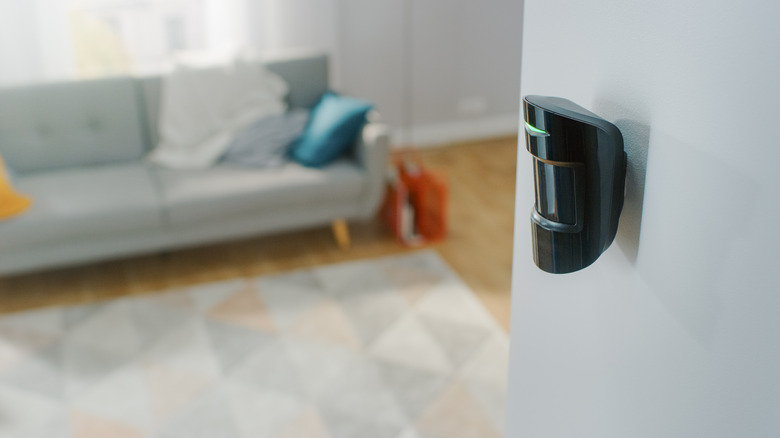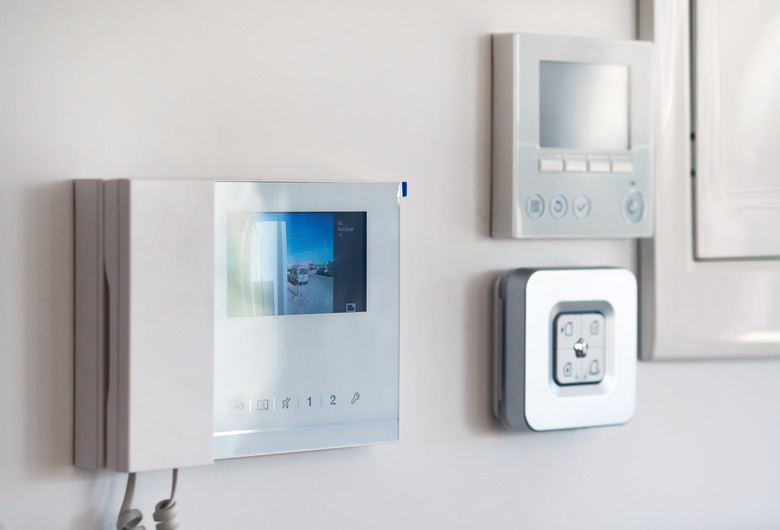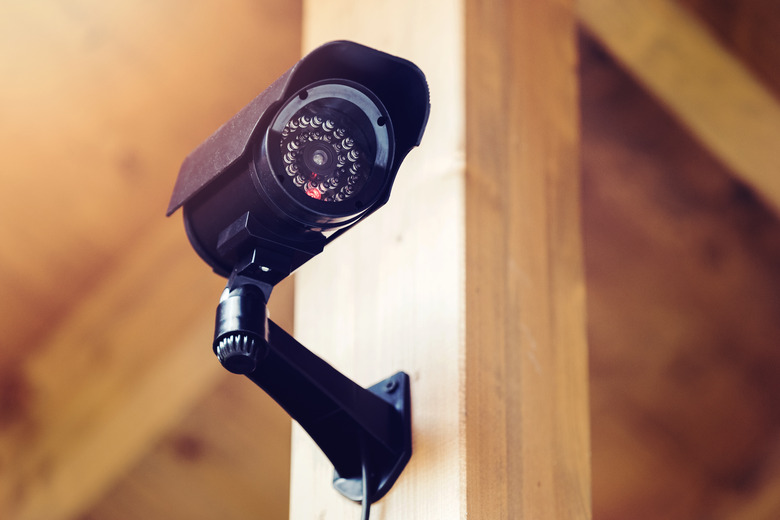Home Security Systems: What You Need To Know Before You Buy
We may receive a commission on purchases made from links.
Before you begin shopping for a new home security system, it's best to think about exactly what you need for peace of mind while you're both inside your home and away. At the most basic level are burglar alarms. These alarms use window and door sensors to alert you when doors and windows throughout your home open. Burglar alarms also frequently feature motion sensors to detect movement in your home and even glass break sensors to alert you of someone trying to break in.
The best home security systems can go way beyond a basic burglar alarm if you wish — but inevitably for a higher price tag. Modern systems can include smoke alarms and carbon monoxide detectors as well. Some include professional monitoring while others give you everything you need for a DIY home security system in one package. Many smart home devices will text you or alert you via mobile app when something is amiss and even let you unlock your doors or turn on lights remotely. Others use cameras and speakers to let you listen to or watch your home from anywhere that has wi-fi. No matter what home security system you choose, research is needed to find the ideal set up for your space.
The Budget Factor
The Budget Factor
When you start shopping for home security systems, the price for a professionally installed setup may make your wallet pucker. The hardware alone can cost $600 or more, with each additional sensor and motion detector adding about $50 each to the cost. Security cameras can easily add $100 apiece. This is the cost for the system alone — before you add any monitoring services.
If you would feel better having a home security system but the cost of pricey equipment and monitoring seems outside your budget, you still have plenty of options, however. Some companies don't charge you anything for the equipment or the installation as long as you agree to a monitoring contract for a specific period of time. If you can handle the monthly monitoring fee, this can be a great way for you to get started.
To save extra cash, you can also pick and choose your alarm system components, starting small and adding to your system as you can. In 34 percent of all break-ins, the intruders enter through the front door. They enter through a first-floor window 23 percent of the time but only enter through a second-story window 2 percent of the time. Knowing this, you may choose to install a home security system that monitors only your front door and the first-floor windows. You can add window sensors to the second floor of your home later when you have more wiggle room in your budget.
Although some sell kits or packages, many alarm companies are happy to design a system that is specific to your needs. This a la carte approach lets you get what you need now and add additional features later if you desire.
You can also save money with a DIY approach. Many DIY security systems come with a window and door sensors that you can quickly apply via a peel-and-stick method as well as easily mounted motion sensors. These systems can be had for as little as $50 or $60 and once you buy them they're yours. Because they're not hard-wired into your home, it's easy to take them with you if you move. You can also buy one-piece security systems like video doorbells — which you can pick up for less than $100 — that will go a long way to making you feel protected.
Professional vs. DIY Installation
Professional vs. DIY Installation
When installing a new home security system, you have the option of installing it yourself or hiring a pro. This decision often comes down to the choice between wired or wireless systems. Wired systems work best when you're securing a large space with multiple floors or lots of doors and windows.
As the name suggests, wired systems need to be hardwired into your home. You'll have to wire in every door, window and motion sensor you want as well as any security cameras or sirens. You'll also need to wire in the control panel. A savvy DIYer with a bit of experience can install a wired system, but most people prefer to have these systems professionally installed.
A wireless system is much easier to install yourself and works well in smaller homes with just a few doors and windows. Most of the components are peel-and-stick, and the control panel can be hung on the wall using a nail just like a picture frame. Wireless alarms are often a better choice for renters since they're easier to move when it's time to relocate, and they don't involve messing with the landlord's property.
Tip
Note that you can ask a professional to install either a wired or a wireless system. You don't want to have false alarms or other malfunctions, so install your systems yourself only if you feel very confident in doing so. If you do go with professional installation, expect to add about 50 percent to the cost of your alarm system.
To Monitor or Not to Monitor?
To Monitor or Not to Monitor?
When shopping for a home security system, you can choose from a local alarm or one that is remotely monitored. There are pros and cons to each choice. A local alarm — or a self-monitoring system — is one that sounds in or around your home when something is amiss. It can also text you or call you when something goes wrong, even if you're out of town or not home. If the alarm is loud enough, your neighbors may also hear it and call the police.
Unfortunately, many municipalities only allow you to mount local alarm sirens inside your home. This serves to prevent your alarm from annoying the neighbors, especially when there is a false alarm. While this practice does serve its purpose, it can mean that your neighbors won't hear your alarm and offer assistance.
To overcome this shortcoming, homeowners often opt for a remotely monitored home security system. In a monitored system, you pay a monthly fee to an alarm monitoring company. When your alarm goes off, it sends a signal to the professional monitoring company, which then calls you to see if you need help. If you can't be reached, it will automatically dispatch the police to your house. Monitored systems do offer better protection, but you pay for that security. The fee averages anywhere from $15 to $60 a month depending on the service provider and the level you choose.
Some DIY systems allow you to add an alarm monitoring service, but you'll need to mindful that these home security companies may need to install additional equipment to make your alarm system better able to communicate when triggered. If you do go for a monitored system with a DIY setup, choose one that allows you to program a forced entry code. This feature allows you to input a special code if an intruder forces you to turn off your alarm. When this forced entry code is entered on the keypad, the sirens in your house remain silent, and the system acts as though it has been disarmed. A silent call for assistance is then sent to your alarm monitoring service so it knows to send you help.
Home Security System Features to Consider Adding On
Home Security System Features to Consider Adding On
The more advanced the security system, the higher the price tag and the more difficult it may be to install yourself. There are, however, a few extra add-ons that may be worth the price depending on your needs. One is a carbon monoxide detector. If you don't already have these in your home, consider adding them as part of your home security system.
Carbon monoxide is an odorless and colorless gas, and many people are unknowingly exposed to it every year with fatal results. The gas is a byproduct of combustion, so your car, fireplace and furnace are all possible sources of exposure. A carbon monoxide detector can literally save your life.
It's equally important to choose an alarm system with a battery backup. Many systems use battery-powered door sensors and other components so they still work when the power goes out. More advanced systems, however, may need backup.
Some monitored systems, for example, use a broadband connection to contact your security company if something is amiss. Many also connect to a standard landline as a backup so they can still make the call if the power goes out. Others may use a battery backup to keep your internet service up and running so they can report issues online during a blackout.
Another important tip is to remember that your home security system can keep people in as well as out. Many systems will allow you to continue monitoring doors and windows even after you disarm the system, often doing so by sending you a text. This is a great tool if your teenage daughter is trying to sneak out through her bedroom window, or an elderly parent with dementia tries to wander out the front door.
Don't forget to look for ease of use when you're shopping. Lots of bells and whistles are nice, but will you actually use them? Remember that you may come in the door with an armload of groceries while holding a screaming toddler's hand. Can you turn the alarm off before the siren sounds? Would a key fob remote for your alarm system make your life easier when your hands are full? You need a system everyone in the house can use and one that works for the way you live.
False Alarms and Permits
False Alarms and Permits
In some areas, the local government regulates alarm systems. Some municipalities require you to get a permit to install and use a home security system. Others set limits on how loud an alarm can be and may require that if your alarm goes off, it must turn itself off after a specified time period.
It's also important to note that many municipalities charge residents for false alarms. If your alarm contacts the monitoring company and dispatches the police when there is no problem, you should expect to pay a fine. You may not have to pay for the first or second false alarm, but repeated incidents will likely result in fees. If too many false alarms are called in, the authorities may revoke your alarm permit and force you to stop using your alarm.
Stay Cautious Regardless
Stay Cautious Regardless
A well-rounded home security system can provide a sense of peace and security about which you should absolutely feel good. Don't let that secure feeling lull you into complacency, however. It's still important to keep the area around your home well lit and to trim back any bushes that can hide would-be intruders. Open garage doors and unlocked entrances may still invite trouble.
If you're going out of town, make sure you don't advertise that fact on your social media pages. Arrange for someone to get your newspapers and mail or temporarily suspend these services so potential thieves don't see them piling up. Put your lights on a timer and consider leaving on a radio. Talk radio stations are particularly good at making it sound like someone is home.
If your alarm system or company provides signage and window stickers, make sure you use them. A sticker in the window warning would-be thieves that you have an alarm system is often enough to deter them. These security signs work so well that some homeowners have signs even if they don't really have an alarm.
References
- Ooma: Beginner's Guide to DIY Home Security
- SafeWise: Installing a Home Security System is Easier Than You Think
- Military HomeSearch: Home Security Tips and Considerations: Assessing Everything From the Front Door to the Router
- HomeAdvisor: How Much Does A Home Security Alarm System Cost?
- U.S. News & World Report: Pro-Installed vs. DIY Home Security Systems
- Security.org: What Is A Home Security System and How Does It Work?
- SafeWise: What Is a Security System and How Does it Work?


